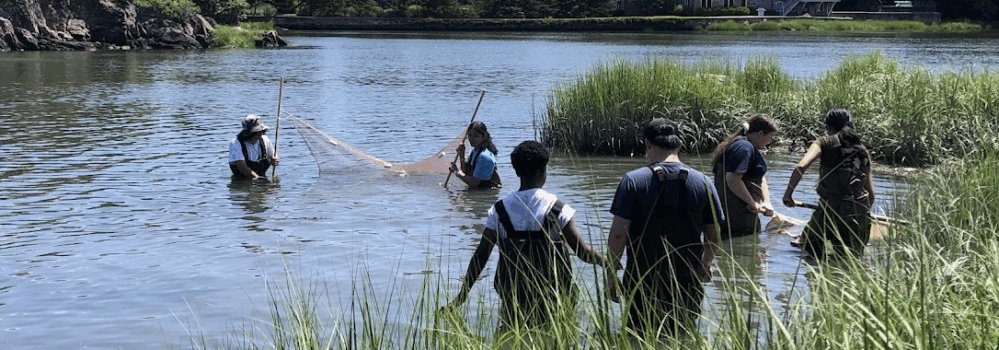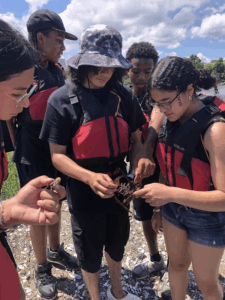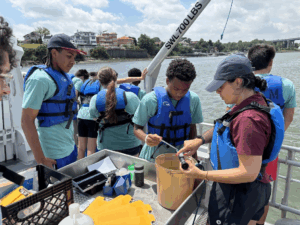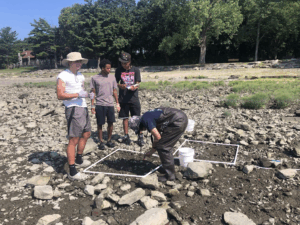
Coastal Eco-Ambassadors: The Leaders of Tomorrow
“We’re creating a generation of local environmentalists,” said Carmen Glenn, a veteran high school teacher in New Rochelle and co-leader of The Coastal Eco-Ambassadors Program.
Now in its second year with support from Long Island Sound Community Impact Fund (LISCIF), the Coastal Eco-Ambassadors Program is inspiring local youth to protect and restore the Long Island Sound.
LISCIF, a partnership between Restore America’s Estuaries and the EPA, provides both financial and technical assistance to improve the health, accessibility, and resilience of the Long Island Sound and communities that depend on it. Restore America’s Estuaries recently announced the 2025 LISCIF Grant Recipients, naming the Coastal Eco-Ambassadors Program among this year’s awardees.
The Coastal Eco-Ambassadors Program is a partnership between the Energy Justice Law and Policy Center (EJLPC) and the City of New Rochelle. It is led by two New Rochelle High School teachers Jonathan LaRosa and Carmen Glenn, with support from Raya Salter, Executive Director of EJLPC.

The program provides youth with immersive marine learning experiences and professional development through summer internships and year-round community events. Participants include local youth employed through the City of New Rochelle’s Summer Youth Employment Program and interns who are recent high school graduates supported through the LISCIF grant. “The goal is to engage kids in hands-on exploration of the ecosystems that are on the Long Island Sound and empower them to be scientists, stewards, advocates,” explained Glenn. “To fall in love with this place and then want to protect it.”
New Rochelle, located about 15 miles north of Manhattan, has diverse coastal ecosystems including salt marshes, mud flats, and oyster habitats. But its proximity to the city brings environmental challenges including pollution and overuse of waterways. Simultaneously, New Rochelle faces the threats of climate change, namely sea-level rise. Healthy coastal ecosystems have the potential to help New Rochelle adapt by filtering water, providing essential habitat and strengthening shorelines. Yet, as LaRosa emphasized, none of this is possible without education. “But nobody knows, right? If we don’t educate, nothing gets done,” he said.

The Coastal Eco-Ambassadors Program aims to change that by empowering the students of New Rochelle to become environmental stewards. Glenn and LaRosa stress the long-term and widespread impact of engaging youth. When young people become invested, they share what they’ve learned with siblings, friends and parents, eventually creating awareness throughout the community.
The program is successful in engaging young stewards due to its emphasis on experiential learning. Students don’t just paddle out and look at the coastline; they observe, analyze, and study it – then determine what’s needed to protect it. They collect data, monitor ecosystem changes, and even help guide restoration projects. By building a living database, the program enables students to track environmental changes and monitor the impact of conservation efforts over time.
In the process, students gain real-world skills that can be leveraged in future careers. They practice basic fieldwork techniques, including how to set up a transect and quadrats, conduct a population estimate, test for water quality, all while designing research projects of their own. With paid internships, participants see that environmental work is not only impactful but also a viable career path.

One such student is Luis Lopez, who became a paid intern through the LISCIF grant after taking Glenn’s Marine Science and AP Environmental Science classes. Through the program, Luis discovered his talent for fieldwork and developed a passion for marine science. On a trip to SUNY Maritime College, just 20 minutes outside of New Rochelle, Luis and the other summer interns boarded a research vessel to test water quality and learned about the college’s coastal oyster restoration. After that trip, Luis decided to apply to SUNY Maritime and plans to study Marine Environmental Science.
For Luis, and many others, the Coastal Eco-Ambassadors Program opened doors to opportunities that might otherwise never have existed. “To get mentored as young scientists, that’s huge,” Glenn reflected. “That’s an opportunity that a lot of kids don’t have and it’s life-changing.”
Plans with the next round of funding will create a longer-term program. Glenn says that longevity is key, especially in sustaining an impactful program like this one. LISCIF is proud to support this continued work. EJLPC would like to see a year-round program for more environmental stewards to grow into the environmental leaders of tomorrow.
